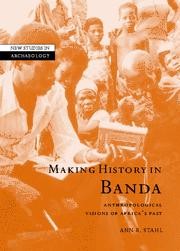Book contents
- Frontmatter
- Contents
- List of figures
- List of plates
- List of tables
- Preface
- 1 Refracted visions of Africa's past
- 2 Envisioning Africa's lived past
- 3 The past in the present: history-making in Banda
- 4 The political-economic context
- 5 Local life in the context of the Niger trade c. 1300–1700
- 6 The changing social fields of Banda villagers c. 1725–1825
- 7 The changing social fields of Banda villagers c. 1825–1925
- 8 Reflections: historical anthropology and the construction of Africa's past
- Notes
- References
- Index
- Other books published in the series
2 - Envisioning Africa's lived past
Published online by Cambridge University Press: 22 September 2009
- Frontmatter
- Contents
- List of figures
- List of plates
- List of tables
- Preface
- 1 Refracted visions of Africa's past
- 2 Envisioning Africa's lived past
- 3 The past in the present: history-making in Banda
- 4 The political-economic context
- 5 Local life in the context of the Niger trade c. 1300–1700
- 6 The changing social fields of Banda villagers c. 1725–1825
- 7 The changing social fields of Banda villagers c. 1825–1925
- 8 Reflections: historical anthropology and the construction of Africa's past
- Notes
- References
- Index
- Other books published in the series
Summary
For centuries Europeans accessed their past through the Other's present. The yawning expanse of deep time opened by Brixham Cave (Trigger 1989:93–94) was rapidly peopled in the image of the world's backward populations, neatly ordered according to the progressive developmentalism of Enlightenment conjectural histories. Book titles evoked the methodology that flowed from a progressive developmental epistemology: Prehistoric Times as Illustrated by Ancient Remains and the Manners and Customs of Modern Savages (Lubbock 1865), or Ancient Hunters and their Modern Representatives (Sollas 1915). By traveling in space, Europeans simultaneously traveled in time (Fabian 1983:8; also Thomas [1989]). Uniformitarian premises underwrote the methodology that shaped comparison of past and present; comparing like to like, savage to savage, barbarian to barbarian, prehistorians animated Europe's deep past, beyond the reach of documentary sources. Thus, for Lubbock (1865:426–582), descriptions of “non-metallic modern savages” supplemented the fragmentary insights of mute stone tools (Stahl 1993a:237–242). This comparative method – “that omnivorous intellectual machine permitting the ‘equal’ treatment of human culture at all times and in all places” (Fabian 1983:16–17) – held sway so long as categories of mundane and typological time (ages and stages, terms like traditional/modern, preliterate/literate, precapitalist/capitalist; Fabian 1983:22–23) dominated anthropology.
This chapter turns to the problem of how we envision a lived past in light of the changing disciplinary contours outlined in Chapter I. Historians, anthropologists, and archaeologists today share an interest in how local, everyday practices were shaped and reshaped by broader historical forces.
- Type
- Chapter
- Information
- Making History in BandaAnthropological Visions of Africa's Past, pp. 19 - 40Publisher: Cambridge University PressPrint publication year: 2001



